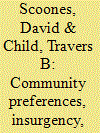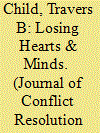| Srl | Item |
| 1 |
ID:
151400


|
|
|
|
|
| Summary/Abstract |
Existing theory on counterinsurgency does not adequately explain persistent insurrection in face of the reconstruction work currently underway in Afghanistan and Iraq. We starkly depart from the literature by developing a simple model of reconstruction allowing misalignment of occupier spending with community preferences. Insurgency arises endogenously as a result of the mix of spending rather than its level. Occupier insistence on its preferred path of reconstruction may lead to fewer projects of any kind being completed. In equilibrium, the occupier may accept an endogenous insurgency to achieve a preferred project mix, or be constrained in its choice even when no insurgency occurs.
|
|
|
|
|
|
|
|
|
|
|
|
|
|
|
|
| 2 |
ID:
189016


|
|
|
|
|
| Summary/Abstract |
“Hearts and minds” theory contends development aid strengthens community support for counterinsurgents by providing jobs and public goods. Based on field interviews in Kabul, we develop an alternative theoretical framework emphasizing instead the ideological preferences of civilians. In our model, some aid projects are ideologically contentious while others are benign. Given a mix of foreign aid, each civilian supports either the counterinsurgents or rebels, depending on his/her idiosyncratic preferences. In this setting, greater provisions of aid can actually erode community support. Donors therefore calibrate the mix of foreign aid to appease population groups with relatively strong ideological sensibilities. Individual-level analysis based on unique Afghan data substantiates key features of our theory. Benign projects lead to favorable opinions of development, while contentious aid has the opposite effect. Moreover, favorable opinions of development are associated with stronger support for government and counterinsurgents, and weaker support for rebels.
|
|
|
|
|
|
|
|
|
|
|
|
|
|
|
|